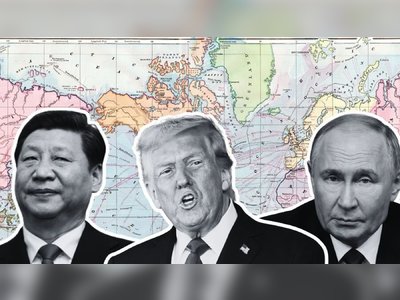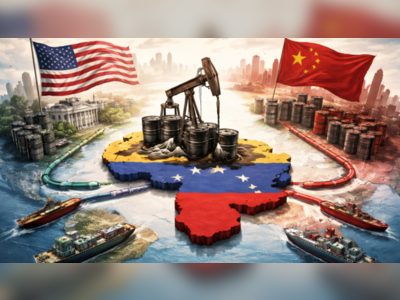
Trump's Interest in Greenland Catalyzes Geopolitical Tensions with Europe
Amid rising global power rivalries, the prospect of U.S. acquisition of Greenland revives concerns over geostrategic control and mineral resources.
The autonomous Danish territory of Greenland, predominantly covered in ice, has once again become a focal point of geopolitical interest, following former U.S. President Donald Trump's declarations about the strategic necessity of controlling the island.
Notably, Greenland is prized for its mineral resources and strategic location in the Arctic.
Trump's rhetoric, suggesting the possible use of force to annex Greenland, has stirred a diplomatic stir among Europe, with French officials decrying the statements as 'imperialistic,' while the German government reiterated the inviolability of borders by force.
These reactions underscore the sensitive nature of territorial sovereignty amidst global strategic competition.
Despite the contentious atmosphere, Denmark's Foreign Minister, Lars Løkke Rasmussen, has remained open to diplomatic dialogue with the United States to safeguard mutual interests, especially as China and Russia expand their foothold in the Arctic.
Concurrently, outgoing U.S. Secretary of State Anthony Blinken sought to defuse tensions by asserting that such acquisition ideas would not materialize.
Granted autonomy over their territory in specific domains, the Greenlandic government still operates under Danish control concerning defense and foreign policy.
The island’s proximity to North America, being closer to New York than Copenhagen, further cements its strategic importance to the United States.
During World War II, American military presence fortified Greenland when Denmark fell to German occupation, a legacy still visible today with the U.S. presence in Pituffik Air Base.
The resurgence of American interest highlights broader geostrategic anxieties, compounded by limited surveillance capabilities in Greenland's eastern airspace, according to political analysts like Ulrik Pram Gad.
With a historical precedent of interest, evidenced by Trump’s 2019 overture to purchase Greenland—promptly refused by Denmark—the island’s geopolitical relevance is undeniable.
Mineral resources signify another layer of international interest.
Greenlanders hold authority over their resources since 2009, yet external powers eye its stocks of critical minerals like rare earth elements.
A memorandum between the U.S. and Greenland in 2019 aimed to solidify cooperation on resource extraction, reflecting similar engagements with the European Union, which identifies the region as a hub for vital mineral resources.
Despite this strategic focus, Greenland’s mining industry remains nascent, limited to active sites in ruby mining and anorthosite extraction—far from realizing their lucrative potential.
This is further compounded by China’s dominant role in the rare earth market, sparking calls for diversification of supply sources to mitigate dependency.
Economic dependency further complicates Greenland’s aspirations for independence.
Financially reliant on an annual subsidy from Denmark, comprising a significant portion of its GDP, Greenland's economic engine remains entrenched in fishing.
Efforts to catalyze economic diversification include infrastructure projects like the planned international airport in Nuuk, a potential boon for tourism.
Complex conditions, ranging from harsh climates to stringent environmental protections, challenge the mining sector’s growth, as observed in resistance to uranium mining and a halt on oil extraction endeavors.
With burgeoning global interest and mounting territorial stakes, Greenland stands at a juncture of significant geopolitical and economic importance.
Notably, Greenland is prized for its mineral resources and strategic location in the Arctic.
Trump's rhetoric, suggesting the possible use of force to annex Greenland, has stirred a diplomatic stir among Europe, with French officials decrying the statements as 'imperialistic,' while the German government reiterated the inviolability of borders by force.
These reactions underscore the sensitive nature of territorial sovereignty amidst global strategic competition.
Despite the contentious atmosphere, Denmark's Foreign Minister, Lars Løkke Rasmussen, has remained open to diplomatic dialogue with the United States to safeguard mutual interests, especially as China and Russia expand their foothold in the Arctic.
Concurrently, outgoing U.S. Secretary of State Anthony Blinken sought to defuse tensions by asserting that such acquisition ideas would not materialize.
Granted autonomy over their territory in specific domains, the Greenlandic government still operates under Danish control concerning defense and foreign policy.
The island’s proximity to North America, being closer to New York than Copenhagen, further cements its strategic importance to the United States.
During World War II, American military presence fortified Greenland when Denmark fell to German occupation, a legacy still visible today with the U.S. presence in Pituffik Air Base.
The resurgence of American interest highlights broader geostrategic anxieties, compounded by limited surveillance capabilities in Greenland's eastern airspace, according to political analysts like Ulrik Pram Gad.
With a historical precedent of interest, evidenced by Trump’s 2019 overture to purchase Greenland—promptly refused by Denmark—the island’s geopolitical relevance is undeniable.
Mineral resources signify another layer of international interest.
Greenlanders hold authority over their resources since 2009, yet external powers eye its stocks of critical minerals like rare earth elements.
A memorandum between the U.S. and Greenland in 2019 aimed to solidify cooperation on resource extraction, reflecting similar engagements with the European Union, which identifies the region as a hub for vital mineral resources.
Despite this strategic focus, Greenland’s mining industry remains nascent, limited to active sites in ruby mining and anorthosite extraction—far from realizing their lucrative potential.
This is further compounded by China’s dominant role in the rare earth market, sparking calls for diversification of supply sources to mitigate dependency.
Economic dependency further complicates Greenland’s aspirations for independence.
Financially reliant on an annual subsidy from Denmark, comprising a significant portion of its GDP, Greenland's economic engine remains entrenched in fishing.
Efforts to catalyze economic diversification include infrastructure projects like the planned international airport in Nuuk, a potential boon for tourism.
Complex conditions, ranging from harsh climates to stringent environmental protections, challenge the mining sector’s growth, as observed in resistance to uranium mining and a halt on oil extraction endeavors.
With burgeoning global interest and mounting territorial stakes, Greenland stands at a juncture of significant geopolitical and economic importance.











